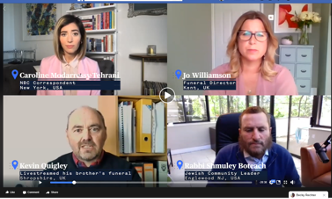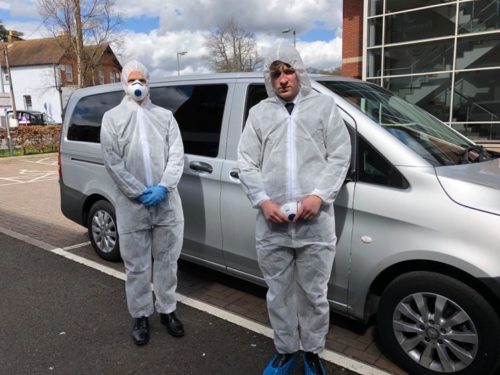The latest in our new series of posts collecting the thoughts and experiences of funeral directors who have worked through the Covid-19 pandemic is from Jo Williamson, founder of Albany Funerals in Kent (top right in the Zoom image below).

“As the government continues to lift the Coronavirus lockdown restrictions this week, now allowing up to 30 people to attend funerals and the reopening of churches for funeral services, it is again time for us funeral directors to reconsider our ways of working, and to readapt once more. Something that we have been doing constantly since mid March. There is still a lot of fear, tiredness, frustration and anxiety in the air, but we are evolving, and reaching acceptance that this constant state of flux will possibly be the ‘new normal’ at least for the near future. It has been a strange time.
Because of our close ties with other progressive funeral directors and the discussions we have regularly on the Good Funeral Guild forum, we had some insight into what was coming back in March.
Like others, we began to make serious preparations weeks before the government put us into lockdown. We purchased PPE before the prices went insane and while you could still order full coverings, respirator masks, long gloves etc, and we split the team to work as separately as possible, such an alien concept to us.
In spite of our relative preparedness, I still see the first two months as dark and frightening times that I will never forget. The fear of driving through a ghost town to go into people’s homes where someone has just died, weighing up the desire for our own protection and theirs with that of not wanting to alienate grieving families with our CSI or even sci-fi like appearance. A tricky balance – I just remember constantly apologising. Funny how now we would not hesitate to wear full PPE even at times of minimum risk, it has become the norm, we all adapt.
Then there was the grappling with what we should and shouldn’t be doing – how far should we be going to help the bereaved say goodbye to their loved ones on their own terms? We had sleepless nights feeling that we were never doing enough, or maybe too much? The support from other Guild funeral directors was so valuable, we texted, Zoomed and Skyped, sent each other hand creams and encouragements, exchanged ideas.
Although the Coronavirus Bill contained welcome changes in legislation updating the archaic legal and administrative processes for funerals, general government guidelines pertaining to care of the deceased and funerals were confused, unclear and offered little support.
Could we trust them when the advice was downgraded? Were we putting people and ourselves at unnecessary risk? Things were constantly changing, we juggled with all of this as the situation evolved, it was obvious that this was a moving target. It was important that nobody on the team felt pushed into taking risks with their own health to satisfy the requests of those grieving, but on the other hand families were in even more acute pain than usual. The distress was palpable – the loss was sudden, the goodbyes had not been said in the usual way, grief-stricken families were separated, we couldn’t see them face to face. How can you provide a healthy balance?
Nevertheless, we did adapt, and so did the families that we worked with, often in the most dire of circumstances. We have been able to have good and real funerals, in spite of the restrictions. Some people even admitted they loved having something intimate that only close family could attend in a first instance, and not the annoying neighbour or the overbearing aunt.
From the start we were determined to reassure our clients that, contrary to the common belief, you don’t only get one chance to have a ‘funeral’, and that showing up to a crematorium following the death isn’t the ‘be all and end all’ of saying goodbye to someone. This could be done anywhere, anyhow, and doesn’t take anything away from the love and care you have for that person.
This was definitely a struggle for the majority, mostly due to the fear of what others would think, because ‘that’s how it’s always been done’ and the need to have something tangibly familiar at a time of great crisis and upheaval. Some could and others could not adapt to this concept, and it was almost exciting to see people who would normally simply go through the motions of a funeral on automatic pilot now thinking completely outside of the box and finding real comfort in that. I really do feel now that there has been a shift, a deeper understanding and perhaps a desire to update our funeral rites – which I welcome wholeheartedly and hope to encourage further.
An unexpected outcome of the pandemic was the media focus on funerals. As many of us know, funeral directors are usually the forgotten, the unspoken link to death, operating in the dark, behind the scenes, in secret, slipping into care homes in the middle of the night whilst doors are hurriedly shut, or adorned in Victorian outfits – mostly only alluded to in articles about the rise in funeral costs.
This was a new angle, we became……… interesting! People were not able to have the funerals they were accustomed to, they wanted information, they wanted our opinion. I gave interviews to the Telegraph, the Independent, the Kent Messenger and featured on an NBC global hangout forum with Michael Jackson’s Rabbi friend and a chap who had arranged a Zoom funeral for his brother who had died of Covid.
It was sometimes surreal being in the middle of a media storm with everything else going on, but refreshing to talk about our work and passion to a newly engaged audience. It can only be positive to talk about death and funerals more freely and I hope that this will be a start of a new awareness and shift in our antiquated rites of passage.”
Jo Williamson

